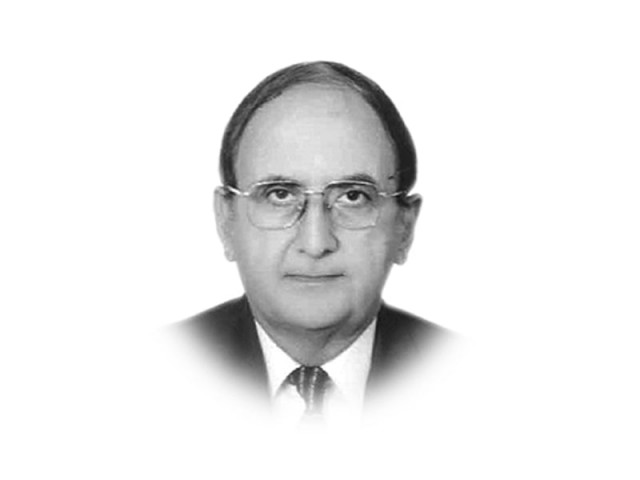Can NS muddle through his term?
The monopolisation of power and influence in the Punjab holds the key to the electoral success of the PML-N

The writer is an independent political and defence analyst. He is also the author of several books, monographs and articles on Pakistan and South Asian affairs
There were similar predictions about the collapse of the PPP federal government in 2008-13. This government also managed to hang on to power despite its questionable track record. Asif Ali Zardari could be described as a shrewd politician who managed to cope with the opposition and the establishment by a combination of accommodation and manipulation of the situation. Nawaz Sharif cannot be described as a shrewd politician to the extent of Zardari. However, Nawaz Sharif has developed his own survival strategy that is facilitated by the failure of the opposition political parties to put their act together.

Nawaz Sharif’s survival kit includes the monopolisation of state power in the Punjab and establishment of a patronage based patrimonial system that assigns the highest premium to loyalty from political leaders, bureaucrats, business community and others who seek government favour. It has created a class of beneficiaries comprising mainly but not exclusively contractors for government tasks like supply of goods and services to government, property and construction business, high profile commercial activity, and others who facilitate the tasks of people with the government. The federal and the Punjab governments are tolerant of hardline Islamic groups if these do not directly challenge the Punjab government. They can discreetly engage in ideological mobilisation of the common people.
The monopolisation of power and influence in the Punjab holds the key to the electoral success of the PML-N and the setting up governments in the Punjab and at the federal level. The province of Punjab has 148 seats out of 272 elected general seats in the National Assembly. The target of the PML-N is to obtain 100 to 110 seats from the Punjab. They can get the support of some independent members and smaller political parties from other provinces to form the federal government.
The PML-N is not expected to tolerate any challenge to its monopoly of power in the Punjab from any quarter, especially the military and the opposition parties. The federal and Punjab government have resisted autonomous security operations against militant and sectarian groups in the province by the Army or the Rangers because this undermines the PML-N image as the sole arbiter of the province. It is engaged in a bitter political fight with the PTI because the latter has challenged its dominant position in the Punjab.The PPP is not viewed by the PML-N as a challenge because it has become very weak in Punjab. It draws support from rural Sindh, where the PML-N has no stake.
As long as the PML-N can protect its control of the Punjab against pressures from the establishment and the PTI, it can safely win the next general election and set up another PML-N government at the federal level and in Punjab.
The PML-N has one advantage. Its political adversaries are divided and there is little, if any, chance of these getting together for challenging the PML-N government. The leading opposition figure, Imran Khan, evokes support at the common person level. However, his politics is unpredictable, lacking the capacity, so far, to work harmoniously with other political leaders and parties. His solo-flight builds pressure on the government but not to the extent that it is forced out.
Other opposition parties are divided because of mutual distrust and leadership ego, competing interests in a province, political inertia and intra party conflicts. The PPP plays a dubious role in opposition. Its leaders make tough statements against the PML-N government but they support Nawaz Sharif whenever the PTI or any other political party challenges the PML-N government. Like the PML-N, the PPP views the PTI as a rival party that threatens to dislodge the PPP’s eminent position in the opposition ranks.
Though some PML-N leaders are known for their anti-army disposition and, from time to time, there are strains in the interaction between the PML-N government and the Army, the latter has shown restraint in flexing its political muscles for a number of reasons, including a consensus in the senior command that they should avoid, if possible, the direct takeover of the government.
Nawaz Sharif has been lucky in its interaction with the judiciary. He is the only prime minister who returned to his office after being dismissed by the president under a judgment of the Supreme Court in 1993. In November 1997, the PML-N loyalists attacked the Supreme Court because one of its bench headed by the then chief justice Sajjad Ali Shah was dealing with a contempt case against Nawaz Sharif. Later, Sajjad Ali Shah was eased out of office. Several years later, some activists were held responsible for this incident. In 2015, a commission set up by the Supreme Court identified irregularities and procedural violations in the 2013 election but it maintained that the overall fairness of the elections was not undermined.
Now, we wait and see if the Prime Minister can be lucky again in the Panama Leaks case where the government lawyers are striving hard to delink Nawaz Sharif from the business activities of his children. Nawaz Sharif is likely to muddle through his term provided he is able to sustain his monopoly of power and influence in the Punjab, stays lucky again with the judiciary in the Panama leaks case, the military limits itself only to grumbling against Nawaz Sharif, Imran Khan cannot learn to work with others in the opposition and the PPP continues to rescue the PML-N government.
Published in The Express Tribune, November 28th, 2016.
Like Opinion & Editorial on Facebook, follow @ETOpEd on Twitter to receive all updates on all our daily pieces.














COMMENTS
Comments are moderated and generally will be posted if they are on-topic and not abusive.
For more information, please see our Comments FAQ